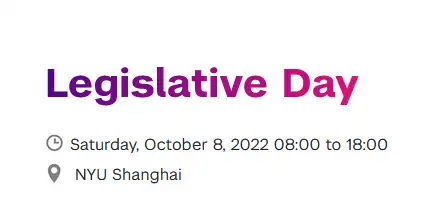Legislative Days: Are They Worth It?
Alongside an ever-changing schedule, NYU Shanghai recently updated the semester with an influx of legislative days, leading students to question their efficacy and purpose.

As a result of unpredictable COVID-19 policies and a semester full of holidays, NYU Shanghai had to employ a large amount of legislative days to make up for lost time. Legislative days cause a shift in the schedule that occupies a weekend as a substitute for a missing weekday class. These changes are something that the NYU Shanghai community is vaguely familiar with. However, given the major efforts put in by the school to allow international students to finally travel to Shanghai, the start of the semester was pushed back by a week, thereby forcing the school to use more legislative days than ever before. As a result, a growing number of individuals have begun to question the effectiveness of these days.
An important facet of this discussion is what qualities make a class effective in the first place. This lies mainly within the level of student attentiveness. If students do not find themselves fully participating, the information being discussed and taught during class time is effectively forgotten or with its importance diminished. According to Gretchen Hoffman, Class of 2024, legislative days suffer from these issues but do have some use. Hoffman said “I think that the education aspect is important, and I don’t necessarily mind ‘extra school,’ but the fact that it only leaves one day of rest before the next school week disrupts the lives of both students and staff.” However, in reference to the use behind legislative days, Hoffman says, “I appreciate that we are able to get the most out of our classes, and cover the same amount of curriculum as originally planned.”
Sophia Johnson, Class of 2025, voices similar feelings, saying, “I think they're a solution to make up for the classes that were missed due to needing to push the start of classes back a week to accommodate all of the new arrivals. And though the intention makes sense, I feel as though they can do more harm than good. Yes, teachers and students alike can gain back that time in the classroom, but only at the cost of people's weekend.” Johnson thinks otherwise in their necessity, saying, “I would prefer that the school not employ legislative days during the semester. I understand why they do, however I just think they wear students out and do more harm than good, especially considering the students with a full schedule in a normal week.”
The common response to issues regarding the removal of legislative days is the rigid form that semesters take on. How is a school going to allow professors to fully flush out their curriculum if the time that they are promised has been significantly reduced? The issue is equally as indisputable but there are some possible alternatives. Hoffman stated, “Given that we are already so used to virtual learning formats, I feel like there can be many options explored there. It’s not like a week of school can be added to the end of the semester because that interferes with holidays and student travel.” Johnson has a similar online-oriented solution, saying, “I would say an alternative to legislative days would be simply watching the recorded lectures that were missed and doing some assignments. The students would have from when the legislative days start, to when they end to complete the work, and the work plus the recorded lectures would equal the allotted class time each Saturday represents.”
The underlying current that runs through these responses is the pressure and stress felt from the reduced weekend. As a result, the undeniable conclusion is that legislative days ultimately harm students and their ability to participate and retain what they learn in class. While the issue of legislative days is extremely multifaceted, the solution cannot be to force students to fully reapportion their efforts to a six-day work schedule.